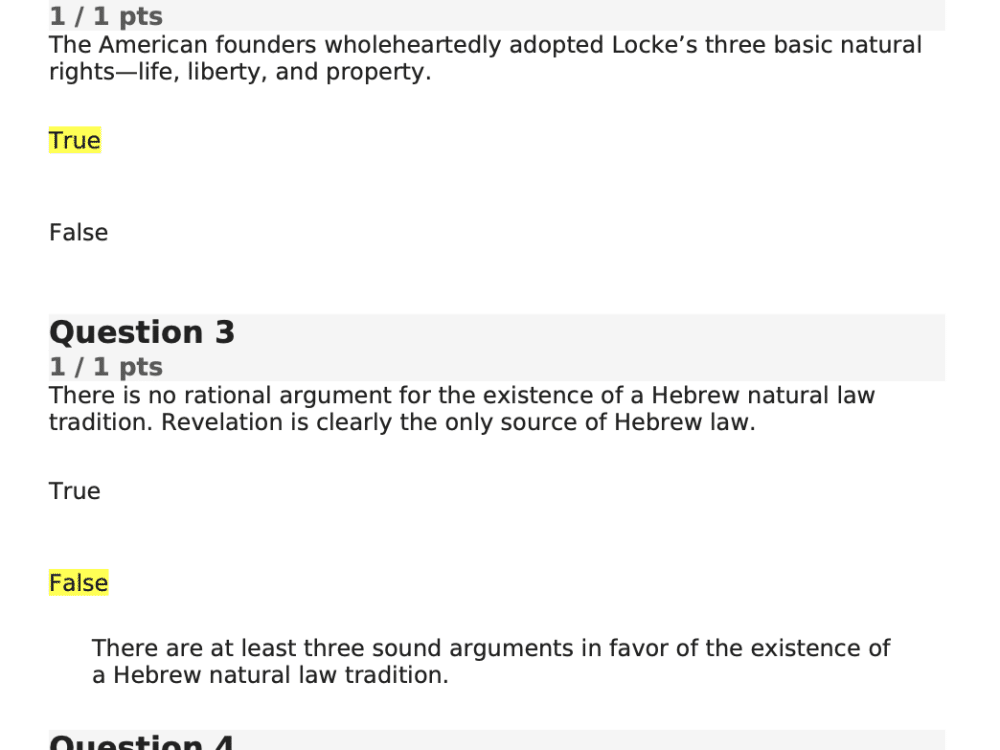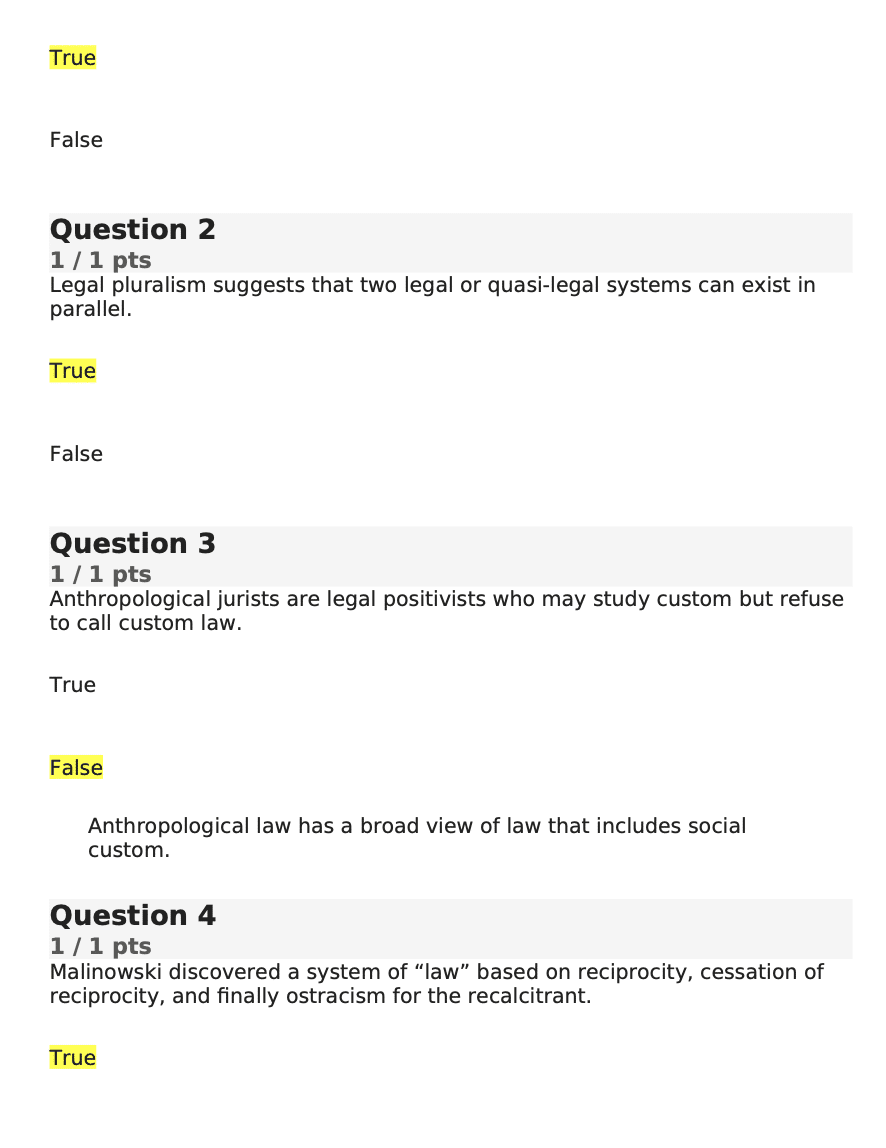
GOVT 345 Quiz 2
GOVT 345 Quiz 2 Liberty University
GOVT 345 Quiz 2 Natural Law
GOVT 345 Quiz 2 Liberty University
- For Aristotle, things like “beauty” and “justice” are transcendent ideals or forms.
- The American founders wholeheartedly adopted Locke’s three basic natural rights—life, liberty, and property.
- There is no rational argument for the existence of a Hebrew natural law tradition. Revelation is clearly the only source of Hebrew law.
- Natural laws are rationally self-evident. The nature of man or the world never enters into the equation.
- Aquinas requires law to be applied equally to all citizens. No exceptions.
- For Aquinas, the well spring of all law is natural law.
- Aquinas’s four-part test for law to be law is essentially his way of calling for the rule of law.
- The final or end cause of the polis is the common good of its citizens.
- Among classical Romans, probably nobody articulated the nature law theory as well as Cicero.
- For Aristotle, the common good is achieved when men submit to just men or just laws.
- For Blackstone, the pursuit of happiness is akin to the right to party.
- Thomas Hobbes embraced natural law since it justified overthrowing the king.
- American jurisprudence sits squarely in the natural law tradition.
- Aristotle and Aquinas agree that there is good and evil but that reason cannot discern the difference.
- Socrates was an absolute positivist: wise rulers lay down the law so wise subjects always obey.
- Hebrews 11:3 says, “By faith we understand that the worlds were framed by the word of God.” Blackstone assumed this to be true.
- It is clear from The Rights of British America that Jefferson does not know the difference between authority and power.
- Aquinas is quite content to use law to punish all vice; for example, private intoxication.
- According to the colonists, civil government has the inherent right to tax. No representation is necessary.
- For Locke, the problem is not that man is ignorant of natural law but that he rebels against it.
Other sets
- The Hebrew natural law tradition dates back to the Middle Ages.
- The American founders wholeheartedly adopted Locke’s three basic natural rights—life, liberty, and property.
- There is no rational argument for the existence of a Hebrew natural law tradition. Revelation is clearly the only source of Hebrew law.
- Augustine was a rationalist who believed logic was the source of all law.
- On the road called natural law tradition, Richard Hooker is like a bridge connecting John Locke and Jefferson to Aristotle and Aquinas.
- For Blackstone, the pursuit of happiness is akin to the right to party.
- Aquinas requires law to be applied equally to all citizens. No exceptions.
- According to Samuel Adams, some unjust laws may still be considered law if they were properly passed by a local representative assembly.
- The gospel is good news. News is communication. Communication presupposes rationality.
- Aquinas is quite content to use law to punish all vice; for example, private intoxication.
- The final or end cause of the polis is the common good of its citizens.
- For Kant, possible consequences should be part of the decision making process.
- Aristotle defines happiness as pleasure, honor, virtue, and prosperity.
- James Otis is among the first American to challenge the British government on the basis of natural law principles.
- Though Aquinas is often accused of having a rationalist epistemology, he is probably arguing for “right” reason or a reason that has been enlightened by revelation.
- One could argue that natural law is revelation—it is general revelation.
- The “big three” Greek philosophers are Aristotle, Socrates, and Maimonides.
- According to Locke, the purpose of civil government is to secure economic equality.
- Natural laws are rationally self-evident. The nature of man or the world never enters into the equation.
- For Aquinas, the well spring of all law is natural law.
Other sets
Set 1
- Hebrews 11:3 says, “By faith we understand that the worlds were framed by the word of God.” Blackstone assumed this to be true.
- Though Aquinas is often accused of having a rationalist epistemology, he is probably arguing for “right” reason or a reason that has been enlightened by revelation.
- American jurisprudence sits squarely in the natural law tradition.
- For Rousseau, man’s chaotic tendencies could be overcome by reason, economic equality, and submission to the general will.
- For Kant, possible consequences should be part of the decision making process.
- For Aquinas, the well spring of all law is natural law.
- For Blackstone, free will means having the liberty to do whatever you want.
- According to Plato, philosopher-kings possess the necessary intellect, virtue, and wisdom to rule.
- Virtues and vices come in pairs. For example one is either cowardly or courageous.
- According to Plato, a dynamic society where people are trying to climb the social hierarchy is the most just.
- Socrates was an absolute positivist: wise rulers lay down the law so wise subjects always obey.
- Natural law refers only to laws that have been posited.
- For Augustine, to violate true law is to violate our fundamental nature.
- Plato’s systematic treatise on the natural law is still one of the greatest works of antiquity.
- Sir William Blackstone was enormously influential on the Continent but American colonists dismissed him as a Tory.
- The literal definition of “aristocracy” means “the rich rule”.
- According to Samuel Adams, some unjust laws may still be considered law if they were properly passed by a local representative assembly.
- Thomas Hobbes embraced natural law since it justified overthrowing the king.
- For Locke, the problem is not that man is ignorant of natural law but that he rebels against it.
- The final or end cause of the polis is the common good of its citizens.
Set 2
- The Torah presupposes natural law, specifically in Deuteronomy 4:8 where God assumes the Israelites already have a basis for judging his law “righteous”.
- On the road called natural law tradition, Richard Hooker is like a bridge connecting John Locke and Jefferson to Aristotle and Aquinas.
- Aquinas’s four-part test for law to be law is essentially his way of calling for the rule of law.
- For Rousseau, man’s chaotic tendencies could be overcome by reason, economic equality, and submission to the general will.
- Sir William Blackstone was enormously influential on the Continent but American colonists dismissed him as a Tory.
- The Hebrew natural law tradition dates back to the Middle Ages.
- According to Plato, a dynamic society where people are trying to climb the social hierarchy is the most just.
- Aquinas requires law to be applied equally to all citizens. No exceptions.
- Natural laws are rationally self-evident. The nature of man or the world never enters into the equation.
- For Aristotle, understanding the nature or purpose (telos) of things is the key to ordering life.
- For Blackstone, free will means having the liberty to do whatever you want.
- For Blackstone, the pursuit of happiness is akin to the right to party.
- Among classical Romans, probably nobody articulated the nature law theory as well as Cicero.
- Plato’s systematic treatise on the natural law is still one of the greatest works of antiquity.
- According to Aristotle, just laws ought to regulate interpersonal interaction.
- For Augustine, to violate true law is to violate our fundamental nature.
- Virtues and vices come in pairs. For example one is either cowardly or courageous.
- Though Aquinas is often accused of having a rationalist epistemology, he is probably arguing for “right” reason or a reason that has been enlightened by revelation.
- For Aristotle, the common good is achieved when men submit to just men or just laws.
- The “big three” natural law philosophers of the medieval period were Augustine, Gratian, and Aquinas.
Set 3
- For Kant, moral principles are self-evident.
- Among classical Romans, probably nobody articulated the nature law theory as well as Cicero.
- The final or end cause of the polis is the common good of its citizens.
- Sir William Blackstone was enormously influential on the Continent but American colonists dismissed him as a Tory.
- Hebrews 11:3 says, “By faith we understand that the worlds were framed by the word of God.” Blackstone assumed this to be true.
- According to Locke, the purpose of civil government is to secure economic equality.
- One could argue that natural law is revelation—it is general revelation.
- The “big three” Greek philosophers are Aristotle, Socrates, and Maimonides.
- For Aquinas, the law written on the heart is all one needs to develop virtuous habits.
- Thomas Hobbes embraced natural law since it justified overthrowing the king.
- For Locke, the problem is not that man is ignorant of natural law but that he rebels against it.
- For Aquinas, the well spring of all law is natural law.
- According to Samuel Adams, some unjust laws may still be considered law if they were properly passed by a local representative assembly.
- Natural laws are rationally self-evident. The nature of man or the world never enters into the equation.
- Aristotle defines happiness as pleasure, honor, virtue, and prosperity.
- American jurisprudence sits squarely in the natural law tradition.
- Plato’s systematic treatise on the natural law is still one of the greatest works of antiquity.
- The literal definition of “aristocracy” means “the rich rule”.
- For Augustine, to violate true law is to violate our fundamental nature.
- For Grotius, a man ought not to rule unless his reason is ruled by and wholly obedient to the God of scripture.
